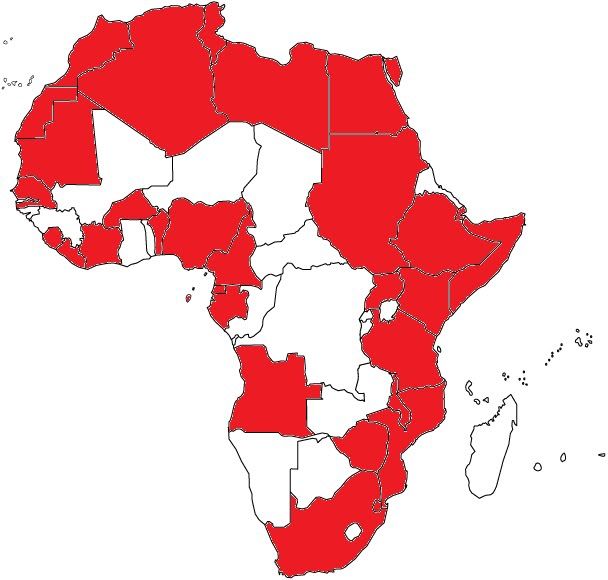Less reported on than the uprisings in Arabic-speaking countries have been a spate of mass protests, riots, and uprisings in Sub-Saharan Africa. And let's not forget that Tunisia and Egypt are both part of Africa. This is a map I've put together, showing all countries on the African continent that have had significant protests since the flight of Tunisia's Zine El Abidine Ben Ali. At least, all that I could find. This has not yet been researched in detail:

Highlighted in red, that's:
- Algeria
- Angola
- Benin
- Burkina Faso
- Cameroon
- Côte d'Ivoire
- Djibouti
- Egypt
- Equatorial Guinea
- Ethiopia
- Gabon
- Kenya
- Liberia
- Libya
- Malawi
- Mauritania
- Morocco
- Mozambique
- Nigeria
- Senegal
- Sierra Leone
- Somalia South Africa
- Sudan
- Swaziland
- Tanzania
- Tunisia
- Uganda
- Zimbabwe
Not all is for the good. While the dictators of Libya and Côte d'Ivoire were justly reviled, the revolutionary uprisings have been hijacked. (If anything, the capture of Laurent Gbagbo is a greater success for Sarkozy than anything NATO has accomplished in Libya so far.) In many countries, established bourgeois opposition figures have been able to place themselves at the head of the protests. In others, repression seems to have worked. In the two most populous and powerful Sub-Saharan countries listed above, Nigeria and South Africa, there are significant obstacles to the emergence of working-class-led political alternatives: In Nigeria, a recent and on-going history of sharp sectarian and ethnic clashes; in South Africa, the continued hegemony of the (increasingly uneasy) tripartite alliance (ANC, SACP and COSATU), and a dark undercurrent of popular hostility to immigrants from other African countries. (And, let me be honest: There's a lot I just don't know about. Anyone more familiar with African politics, please comment.) Yet the sheer scale of the revolts, and the diversity of their locales, is itself a hopeful sign.
On the other hand, despite the imperialist-sponsored stalemate in Libya, and the bloody crackdown in Bahrain, events remain interesting in the Arab world, with new developments in the mashreq: Syria may be the next to go--Bashar, didn't you learn from Ben Ali and Mubarak that concessions just whet the masses' appetites? And even the Saudis have problems.
No comments:
Post a Comment